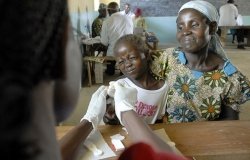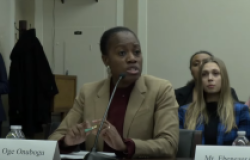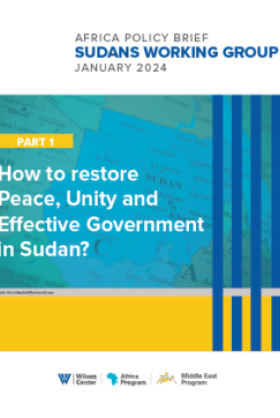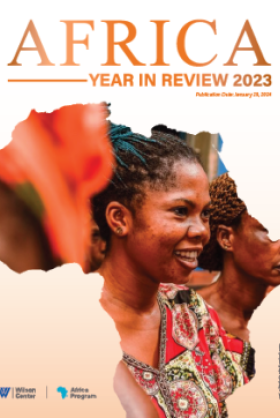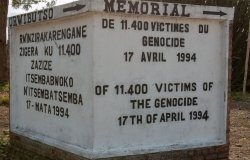MCC and Mozambique: A Partnership for Development
On July 12, 2007, the Africa Program at the Woodrow Wilson International Center for Scholars and the Millennium Challenge Corporation (MCC) hosted an event entitled "MCC and Mozambique: A Partnership for Development" to celebrate the approval by the Board of the Millennium Challenge Corporation of a five year, $506.9 million Millennium Challenge Compact to reduce poverty and increase economic growth in Mozambique. The Compact, which focuses on the four northern provinces of Mozambique which have been lagging behind the rest of the country's development, is focused on improving the welfare of the population.
Overview
MCC and Mozambique: A Partnership for Development
A presentation by:
Aiuba Cuereneia, Minister of Planning and Development, Republic of Mozambique
Ambassador John Danilovich, CEO, Millennium Challenge Corporation
Stephen Gaull, Country Director, Millennium Challenge Corporation
Emilio Muchanga, MCA Mozambique Country Team
Host: Howard Wolpe, Director, Woodrow Wilson International Center for Scholars
On July 12, 2007, the Africa Program at the Woodrow Wilson International Center for Scholars and the Millennium Challenge Corporation (MCC) hosted an event entitled "MCC and Mozambique: A Partnership for Development" to celebrate the approval by the Board of the Millennium Challenge Corporation of a five year, $506.9 million Millennium Challenge Compact to reduce poverty and increase economic growth in Mozambique. The Compact, which focuses on the four northern provinces of Mozambique which have been lagging behind the rest of the country's development, is focused on improving the welfare of the population.
 Stephen Gaull described the details of the Compact and its optimistic prospects. Mozambique was in a civil war and had a centrally planned economy fifteen years ago, and today has a sustained growth rate of 8% a year, one of the fastest in Africa. He explained that the Millennium Challenge Corporation is planning on investing in infrastructure, agriculture, water, sanitation, drainage and roads, as well as ensuring efficient and secure access to land. He emphasized the importance of the support of the public and private sector in Mozambique, as well as the UNDP and World Bank as important partners in the Compact creation process. "The Compact is extremely transformational," he said. "The overall robust economic returns make this an excellent investment for the U.S. government and the American tax payer dollars."
Stephen Gaull described the details of the Compact and its optimistic prospects. Mozambique was in a civil war and had a centrally planned economy fifteen years ago, and today has a sustained growth rate of 8% a year, one of the fastest in Africa. He explained that the Millennium Challenge Corporation is planning on investing in infrastructure, agriculture, water, sanitation, drainage and roads, as well as ensuring efficient and secure access to land. He emphasized the importance of the support of the public and private sector in Mozambique, as well as the UNDP and World Bank as important partners in the Compact creation process. "The Compact is extremely transformational," he said. "The overall robust economic returns make this an excellent investment for the U.S. government and the American tax payer dollars."
 Emilio Muchanga stressed the importance of the defined framework of the MCC Compact and the clear consolidated principles that will be so instrumental. He explained that the northern provinces were chosen because of their high potential, the size of their populations, and the existence of a complementary framework to build a sound program upon. "The Compact will provide a water supply in eight urban centers, build 491 km of roads, and provide a farm income support project," he said. He believes that this Compact will promote business investment and employment, reduce poverty, spur growth, and improve the competitiveness of the private sector.
Emilio Muchanga stressed the importance of the defined framework of the MCC Compact and the clear consolidated principles that will be so instrumental. He explained that the northern provinces were chosen because of their high potential, the size of their populations, and the existence of a complementary framework to build a sound program upon. "The Compact will provide a water supply in eight urban centers, build 491 km of roads, and provide a farm income support project," he said. He believes that this Compact will promote business investment and employment, reduce poverty, spur growth, and improve the competitiveness of the private sector.
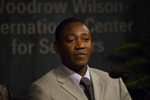 Ambassador John Danilovich expressed his pleasure at this important day marking the sixth MCC Compact in Africa and the twelfth overall. He expects that the development program will reach 5 million Mozambicans, strengthen the economy, improve the quality of life, increase jobs, productivity and the investment climate. "The MCC model and incentive program is working," he said. "MCC rewards good governance, investment in people, and economic freedom." He also confirmed that there would be accountability and transparency both on the part of the donors and the recipients.
Ambassador John Danilovich expressed his pleasure at this important day marking the sixth MCC Compact in Africa and the twelfth overall. He expects that the development program will reach 5 million Mozambicans, strengthen the economy, improve the quality of life, increase jobs, productivity and the investment climate. "The MCC model and incentive program is working," he said. "MCC rewards good governance, investment in people, and economic freedom." He also confirmed that there would be accountability and transparency both on the part of the donors and the recipients.
 Minister Aiuba Cuereneia also cited his pleasure at participating in this important day for Mozambique and being present with his fellow Mozambicans and friends of Mozambique. As the Minister of Planning and Development, he applauded the plans for water and sanitation, market access roads, land registration, increase of coconut farm yields and reduction of transaction costs. "This mission will supplement the government initiative," he said. "The success of the program requires the involvement of government stakeholders, MCC, business sector and civil society in the stages of the process." He thanked the MCC team and reiterated the government's commitment to this Compact for development.
Minister Aiuba Cuereneia also cited his pleasure at participating in this important day for Mozambique and being present with his fellow Mozambicans and friends of Mozambique. As the Minister of Planning and Development, he applauded the plans for water and sanitation, market access roads, land registration, increase of coconut farm yields and reduction of transaction costs. "This mission will supplement the government initiative," he said. "The success of the program requires the involvement of government stakeholders, MCC, business sector and civil society in the stages of the process." He thanked the MCC team and reiterated the government's commitment to this Compact for development.
Drafted by Amy Van Buren, Africa Program Intern and Roseline Fodouop Tekeu, Program Assistant, Africa Program.
Hosted By

Africa Program
The Africa Program works to address the most critical issues facing Africa and US-Africa relations, build mutually beneficial US-Africa relations, and enhance knowledge and understanding about Africa in the United States. The Program achieves its mission through in-depth research and analyses, public discussion, working groups, and briefings that bring together policymakers, practitioners, and subject matter experts to analyze and offer practical options for tackling key challenges in Africa and in US-Africa relations. Read more
Thank you for your interest in this event. Please send any feedback or questions to our Events staff.




